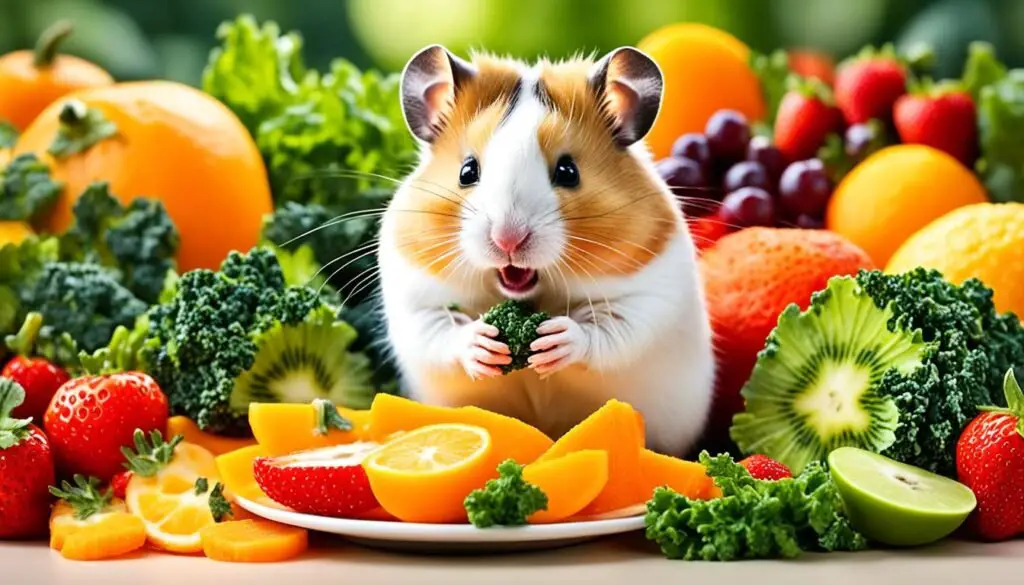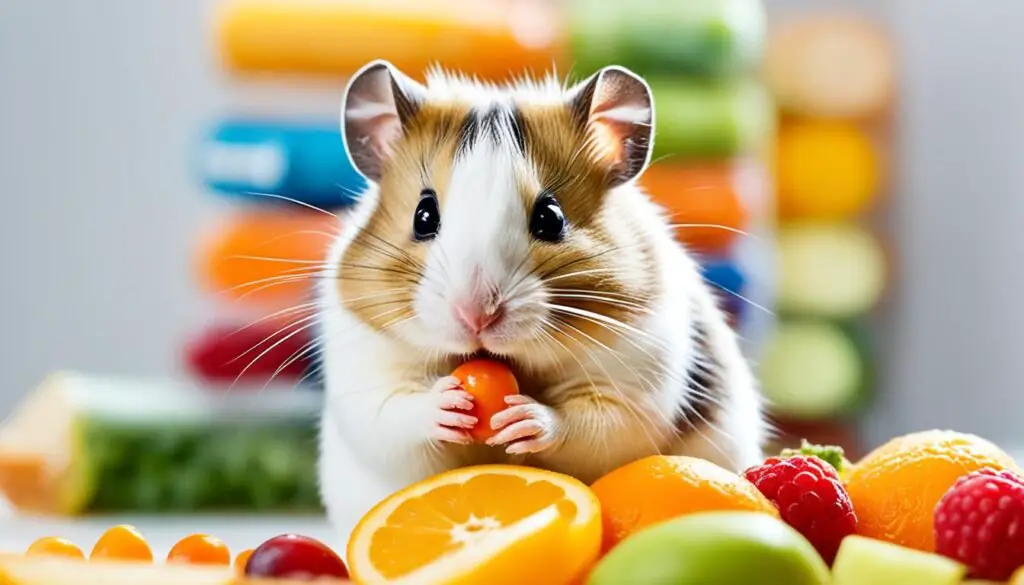Did you know that hamsters require vitamin C in their diet to promote healing and prevent diseases? Yes, just like humans, these adorable little pets need their daily dose of vitamin C to stay healthy and happy. In this article, we will explore the best food sources of vitamin C for hamsters and provide you with valuable tips to ensure your furry friend gets the right amount of this essential nutrient.
From broccoli to fruits, we will discuss the natural foods that are rich in vitamin C and suitable for hamsters. We will also highlight the importance of vitamins for hamsters in general, as well as the specific role of vitamin C in preventing a painful condition called scurvy.
Moreover, we will guide you on choosing the right vitamin C source for your hamster, whether it be through natural foods or supplements. We will address common concerns, such as the idea of supplementing vitamin C through water, and provide expert advice on ensuring safety and moderation in your hamster’s diet.
So, if you want to provide the best possible nutrition for your furry friend and learn more about the importance of vitamin C in a hamster’s diet, keep reading!
Importance of Vitamins for Hamsters
Along with vitamin C, hamsters also require other important vitamins to support their overall health and well-being. Lack of these vitamins can lead to various health issues, including slow development, weakened skeletal system, and liver damage. It is crucial to provide your hamster with a well-rounded diet that includes a variety of nutrient-rich foods.
Vitamins such as A, B, D, E, and K play vital roles in hamster health. Vitamin A promotes good vision and a healthy immune system, while B vitamins help with metabolism and energy production. Vitamin D is essential for proper calcium absorption and bone health, and vitamin E acts as an antioxidant, protecting cells from damage. Vitamin K supports blood clotting and healthy circulation.
To ensure your hamster gets the necessary vitamins, incorporate a range of foods into their diet. Green vegetables like kale and spinach are rich in vitamins A, C, and K. Carrots provide a good source of vitamin A, and meats such as chicken or turkey offer essential B vitamins. Certain seeds, such as pumpkin seeds, contain vitamin E. Keep in mind that moderation is key, so consult with your veterinarian for guidance on the appropriate amounts for your hamster’s specific needs.
Remember, a balanced diet is crucial for your hamster’s well-being. By providing a variety of foods that contain different vitamins, you can help prevent deficiencies and support optimal health. Always monitor your hamster’s diet and consult with a veterinarian if you have any concerns about their nutritional needs.
Vitamin C and Scurvy in Hamsters
Vitamin C plays a crucial role in the health of hamsters by helping to prevent a painful condition known as scurvy. Scurvy is a vitamin C deficiency that can lead to various symptoms in hamsters, such as fur loss, lethargy, weight loss, and impaired movement. To ensure your hamster receives an adequate amount of vitamin C and avoid scurvy, it’s essential to provide them with natural sources of this vital nutrient.
One of the best ways to supply your hamster with vitamin C is through their diet. Natural food sources rich in vitamin C include broccoli and various fruits. These can be introduced into their regular diet to help meet their vitamin C requirements. To ensure your hamster’s health and well-being, it’s essential to offer a varied diet that includes these natural vitamin C sources.
In some cases, your hamster may require additional vitamin C supplementation to prevent deficiency and combat scurvy. If you notice signs of vitamin C deficiency or if your hamster has specific health conditions that require higher vitamin C intake, consult with a veterinarian. They can recommend suitable vitamin C supplements and guide you on the appropriate dosage to meet your hamster’s needs.

Choosing the Right Vitamin C Source for Your Hamster
When it comes to providing your hamster with the essential vitamin C they need, it’s important to choose natural options that are safe for their consumption. Thankfully, there are plenty of vitamin C-rich foods that are suitable for hamsters.
Two excellent sources of natural vitamin C for hamsters are broccoli and most fruits. Broccoli is not only rich in vitamin C but also provides other important nutrients for your hamster’s overall health. Fruits, such as oranges, strawberries, and kiwi, are also packed with vitamin C and can be included in your hamster’s diet in small portions.
While it’s crucial to provide your hamster with enough vitamin C, it’s equally important to avoid excessive doses. Giving your hamster too much vitamin C can actually lead to health problems. Follow the recommended serving sizes for foods high in vitamin C and consult with your veterinarian for guidance on the appropriate portion sizes and frequency of feeding.
To ensure you are providing the best vitamin C source for your hamster, it’s always a good idea to consult with your veterinarian. They can advise you on the specific needs of your hamster and help you create a well-rounded and balanced diet plan that includes the right amount of vitamin C.
Benefits of Natural Vitamin C for Hamsters:
- Supports immune system health
- Promotes wound healing
- Helps with collagen production for healthy skin and fur
- Aids in maintaining healthy bones and teeth
Supplementing Vitamin C for Hamsters
If you find it challenging to provide enough vitamin C through natural food sources alone, you can consider supplementing your hamster’s diet with vitamin C. There are hamster-specific vitamin C drops available that can be easily mixed with their food. It is important to follow the dosage instructions provided on the supplement and consult with your veterinarian before adding any supplements to your hamster’s diet.
Supplementing vitamin C provides an additional boost to your hamster’s overall health and immune system. It ensures that your furry friend receives an adequate amount of this essential nutrient, even if their diet may fall short. By including vitamin C drops in their diet, you can help prevent deficiencies and related health issues.
When shopping for hamster-specific vitamin C supplements, look for trusted brands that offer high-quality products. Reading customer reviews and consulting with fellow hamster owners can also provide insights on the best options available. Remember, it is always recommended to consult with your veterinarian before introducing any new supplements or dietary changes.
Remember to maintain a balanced diet for your hamster and provide a variety of nutritious foods in addition to the vitamin C supplement. Natural sources of vitamin C, such as broccoli and fruits, should still play a significant role in their diet. Combining both natural and supplemented vitamin C can ensure that your hamster receives the necessary nutrients for optimal health.

Vitamin C and Water vs. Food
When it comes to providing vitamin C for your hamster, you may wonder whether it’s better to offer it in their water or their food. While some hamsters may receive their vitamin C through water-soluble powders added to their drinking water, it is actually more efficient to provide vitamin C through their food.
Hamsters typically do not drink a large amount of water, so relying solely on water-based vitamin C supplements may not ensure they are getting enough of this essential nutrient. By incorporating vitamin C-rich foods into their diet, you can provide a more reliable and effective source of this vital nutrient.
When it comes to hamster diet with vitamin C, there are several natural options available. Fruits like oranges, strawberries, and kiwis are great choices as they are not only tasty but also packed with vitamin C. Green leafy vegetables such as kale and spinach are also excellent sources.
By including these vitamin C-rich foods in your hamster’s diet, you can have peace of mind knowing that they are receiving an adequate amount of this essential nutrient. It’s always a good idea to consult with your veterinarian to determine the best approach for providing vitamin C to your hamster based on their specific needs.
To get a visual representation of vitamin C-rich foods for hamsters, take a look at the image below:
Ensuring Safety and Moderation
While providing vitamin C to your hamster is essential for their health, it is equally important to exercise caution and moderation. Excessive amounts of vitamin C can potentially harm your hamster and lead to health issues. To ensure the well-being of your furry companion, it is crucial to follow these guidelines:
- Consult with your veterinarian: Before adding any supplements or increasing the amount of vitamin C in your hamster’s diet, consult with your veterinarian. They can provide personalized advice based on your hamster’s specific needs and health condition.
- Avoid over-supplementing: Although vitamin C is important, avoid over-supplementing your hamster’s diet. Providing too much vitamin C can cause digestive issues and even toxicity. Stick to the recommended dosage and only administer additional vitamin C if advised by your veterinarian.
- Focus on natural sources: Instead of solely relying on supplements, prioritize natural sources of vitamin C for your hamster. Fresh fruits and vegetables, such as broccoli and certain fruits, are excellent options. These not only provide vitamin C but also offer other essential nutrients that contribute to a balanced diet.
- Observe your hamster’s behavior: Pay close attention to your hamster’s behavior and any changes in their health. If you notice any adverse reactions or unusual symptoms after introducing vitamin C or supplements, consult with your veterinarian immediately.
Remember, maintaining moderation and ensuring the safety of your hamster is crucial when it comes to their vitamin C intake. By following these guidelines and working closely with your veterinarian, you can provide your hamster with the right amount of vitamin C to support their overall well-being.
Balanced Diet for Optimal Hamster Health
Providing a balanced diet is crucial for ensuring optimal health in your beloved hamster. A well-rounded diet that includes a variety of nutritious foods, including those rich in vitamin C, is essential for their overall well-being.
Incorporating vitamin C-rich foods into your hamster’s diet is important since hamsters cannot produce this vital nutrient themselves. Natural sources of vitamin C such as broccoli and fruits should be included to meet their dietary requirements. These foods not only provide the necessary vitamin C but also offer a range of other essential nutrients for your furry friend.
In addition to vitamin C, your hamster’s diet should consist of a diverse range of vegetables, fruits, grains, and high-quality hamster pellets. This variety provides a balanced mix of carbohydrates, proteins, vitamins, and minerals that are vital for their growth, energy, and overall health.
It is recommended to consult with your veterinarian on creating a well-balanced diet plan tailored to your hamster’s specific needs. They can provide expert guidance and advice on the appropriate amounts and combinations of foods to ensure your hamster receives all the essential nutrients they require for optimal health.
